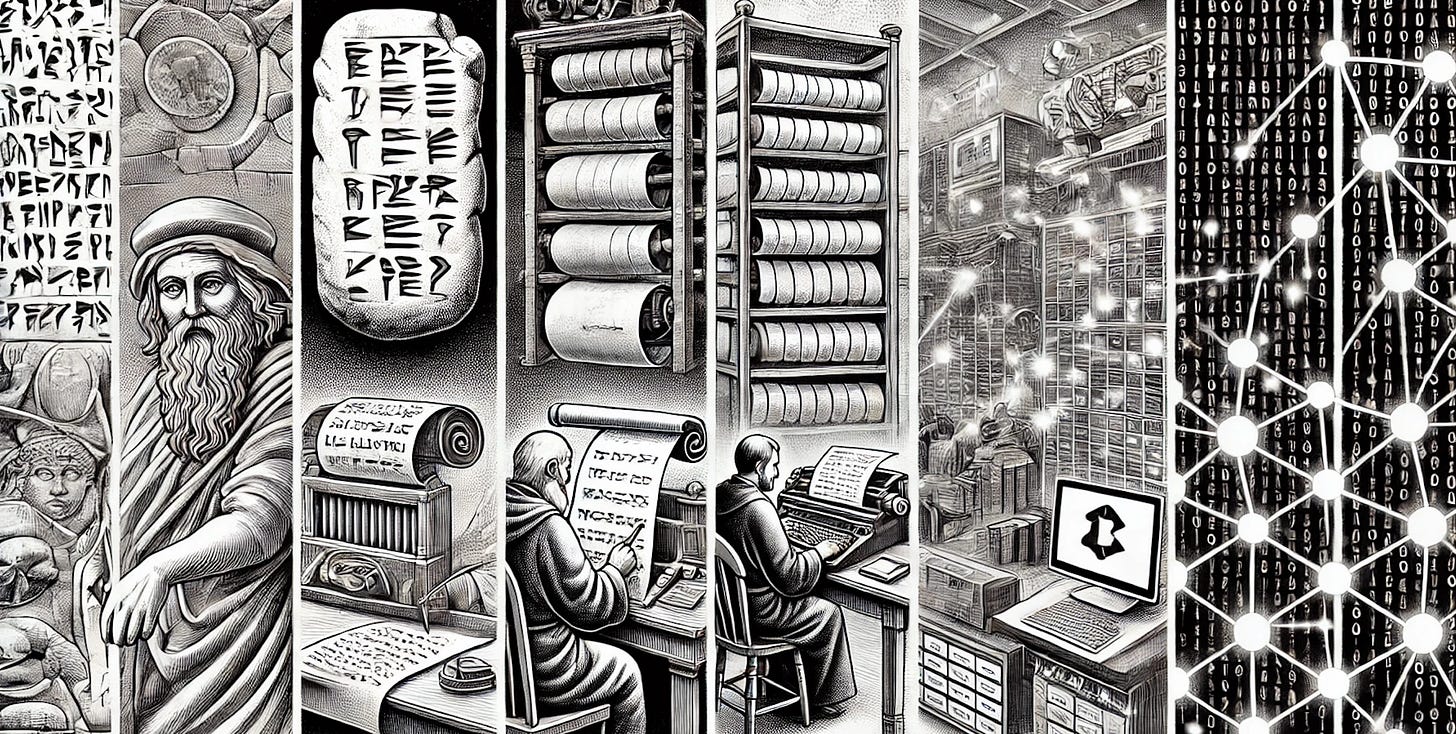Blockchain: Rewriting the Way We Write History
"Who controls the past controls the future. Who controls the present controls the past." — George Orwell, 1984
Throughout history, the recording of events has always been a function of those in power. The ability to rewrite history has shaped collective memory, influenced societal structures, and, in many cases, determined the course of nations. But what happens when the power to control records is no longer concentrated in a central authority?
The 2008 financial crisis exposed the fragility of trust in traditional institutions, particularly in the financial sector. It also introduced us to a groundbreaking solution—one that promises to reshape not just finance, but the very fabric of record-keeping itself: the Bitcoin network, powered by the first-ever blockchain.
For the first time in human history, we are witnessing a technological breakthrough that allows us to move beyond centralized record-keeping. This shift has profound societal implications, including:
Tamper-proof historical records: No single entity can alter past records without consensus from the entire network.
Decentralized governance: The power to validate and store information is distributed among participants rather than controlled by a central authority.
Trust redefined: Trust is no longer based on reputation, institutions, or intermediaries; instead, it is embedded in cryptographic protocols and consensus mechanisms.
The Misunderstanding of Blockchain’s True Impact
As discussions around crypto, blockchain, and Web3 continue to evolve, I often see misconceptions about the technology’s true implications. Many still view it as a speculative tool for quick profits, or as a niche technology limited to gaming and digital collectibles.
Having followed blockchain developments for over a decade, I’ve noticed a lack of collective understanding regarding its everyday impact on institutions, governance, and economic systems. This article marks the beginning of my journey to communicate an institutional perspective on blockchain—one that explores its potential to decentralize not just finance, but the way we think, organize, and operate as a society.
Understanding Institutions: The Untold Story of Consensus
Economist Douglas North defined institutions as the "set of rules that shape human interactions." This framework allows us to view economic and political systems as structured games—where rules, defined environments, and players interact to produce incentives and outcomes.
The way rules are crafted (and the rules for crafting those rules) fundamentally divides the world into two models:
Democracies, where rules are theoretically formed by a process of broad consensus.
Dictatorships, where rules are dictated unilaterally by a state or governing authority.
For centuries, institutions have operated under these centralized structures. But in 2012, when I first read Bitcoin’s whitepaper, I realized something transformative—blockchain represents an entirely new paradigm for institutional design.
Why Bitcoin and Blockchain Are Revolutionary
Bitcoin, as the first blockchain-based system, introduced a radical shift in how we approach record-keeping, governance, and trust. Here’s why it fundamentally changes the game:
Satoshi Nakamoto’s anonymity makes it robust: Without a central figure to attack or influence, the system remains resilient.
A tamper-proof ledger ensures historical integrity: No individual or organization can unilaterally alter past transactions.
Power is distributed across a network: Decision-making is decentralized, preventing the concentration of authority.
Trust is replaced by programmable trust: Instead of relying on institutions, participants trust mathematical algorithms and cryptographic proofs.
The system is antifragile: Unlike traditional institutions that weaken under stress, decentralized networks grow stronger through adversities.
It’s Not Just Revolutionary—It’s Genius.
Record-keeping and Its Evolution: From Tabloids to Blockchains
Accountability has always been tied to the control of records, whether through handwritten manuscripts, government-led archives, or centralized databases. However, each of these methods relied on a trusted intermediary—someone who could alter, manipulate, or censor information if needed.
Blockchain introduces a paradigm shift in how we record, verify, and access information:
From oral history to written records → Vulnerable to bias and selective memory.
From newspapers and media conglomerates → Controlled by corporate and political interests.
From centralized digital databases → Susceptible to hacks, fraud, and censorship.
To blockchain-powered decentralized ledgers → Immutable, permissionless, and transparent.
Blockchain is not just a financial innovation—it is a tool for historical truth.
Imagine a world where election results cannot be manipulated, financial transactions are fully traceable, and institutional corruption is exposed through publicly auditable ledgers. This is not a distant dream; it is already happening.
The Future of Blockchain: A Blueprint for Decentralized Thinking
Beyond its technical applications, blockchain represents a new way of thinking. It challenges the long-standing assumption that human systems must rely on central authorities to function. Instead, it opens the door to a decentralized future—one where power is distributed, trust is algorithmic, and history is immutable.
As we navigate this transformation, we must shift our perspective:
Blockchain is not just about finance; it’s about governance.
It’s not just about crypto; it’s about accountability.
It’s not just a technology; it’s a movement toward decentralization.
The implications of blockchain go far beyond speculative investments and digital currencies. It forces us to rethink how institutions operate, how history is recorded, and who has the authority to define truth.
This is only the beginning.
🚀 I’ll be writing about the institutional implications of this technology across industries and social organizations. Stay tuned!


